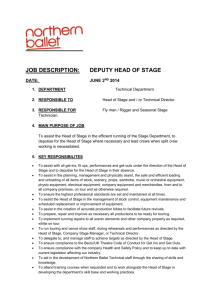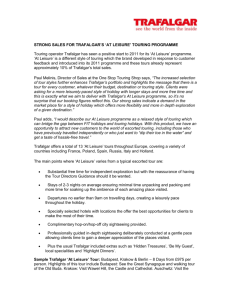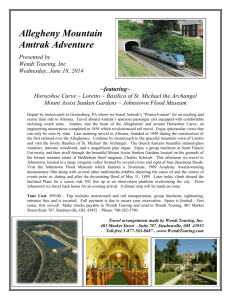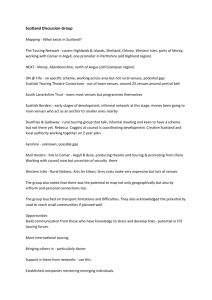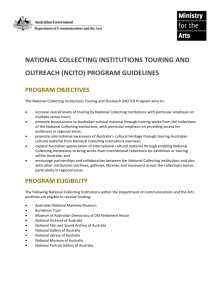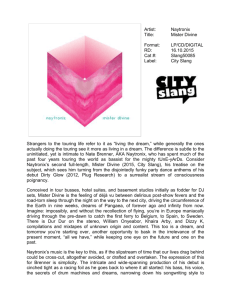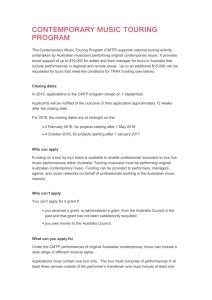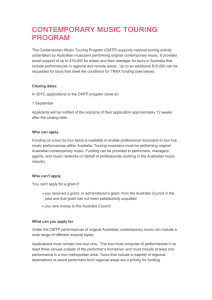Performing arts touring: a strategic approach
advertisement
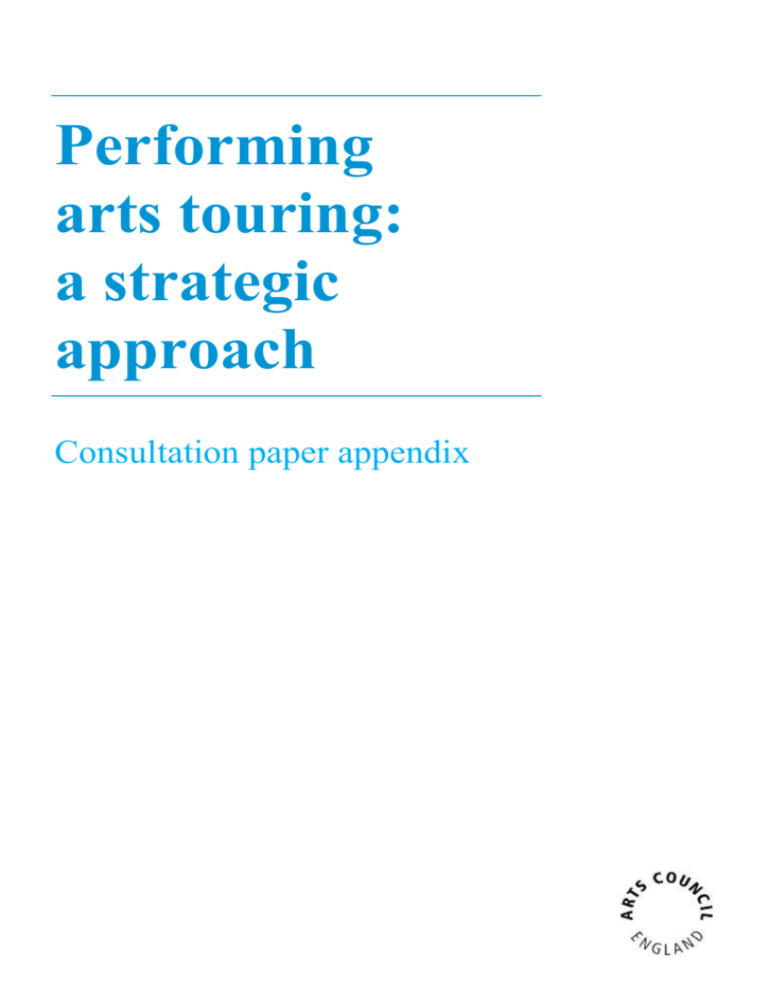
Performing arts touring: a strategic approach Consultation paper appendix Performing arts touring: a strategic approach Touring is one of the most flexible and creative ways of bringing live performance to people. Art, artists and audiences are all developed through touring. New ideas are tested, successful shows are given a longer life and audiences experience a wide range of work. The Department for Culture, Media and Sport publication Culture on Demand (July 2007) refers to the ‘localisation of culture’ as a motivation for participation and attendance. Lack of time, money and access to transport are often cited as barriers for people, so it is important that art is available within their communities. In his review, Supporting excellence in the arts, Sir Brian McMaster recommended that ‘a new way forward be found that reclaims a strategic approach to touring, while exploiting the regional structures created by the Arts Council’s reorganisation’.1 We have acted on this recommendation, recognising that an informed overview of performing arts touring is central to our work, and should be developed as a specialist area in its own right. We fund touring work so that people across the country have the opportunity to see and experience great art. Locally created work varies enormously, and touring has a vital role to play in addressing inequalities of access to arts experiences within particular areas and communities. It is not only a performance that can be innovative, touring can be so in itself – revealing new places and ways in which to present work, and new ways of attracting audiences. As in all areas of the arts, digital technologies are changing how we distribute performing arts. For example, we are now seeing live transmissions of performances from theatres into cinemas. However, while we are supporting many developments and recognise the pace of change, we remain committed to finding ways for the public to continue to enjoy the collective experience of live performance, and this will be central to our touring strategy over the coming years. International tours have given audiences across England opportunities to see world-class work, particularly outside London, and remain relevant to our future touring strategy. We would support artists’ and companies’ efforts to take their work abroad, reflecting as it does our goal of seeing talent and artistic excellence thriving and celebrated in England and internationally. We will ensure that our touring strategy is directly informed by any new or relevant work on environmentally sustainable business models. Our core investment in touring companies is considerable, totalling more than £63 million in 2008/9 (across music, theatre and dance). In addition, we spent about £6.2 million on national touring projects through Grants for the arts in this year. We also intend our future touring approach to cover areas such as live art, live literature and outdoor arts. We have informally consulted people within the arts about a more strategic approach to touring throughout the latter half of 2009, and have received broad support for our proposals. 1 McMaster, Sir Brian, Supporting excellence in the arts: from measurement to judgement, January 2008, Department for Culture, Media and Sport Achieving great art for everyone Performing arts touring: a strategic approach Touring is one of the key ways in which we will deliver Goal 3: ‘more people value and enjoy the arts’. To help to meet this goal, we want our strategic approach to touring to achieve: • a more balanced distribution of work across the country. We want to give more consideration to tour destinations in our funding decisions, alongside the quality and range of the work itself • a greater number and wider range of people experiencing touring work • a greater diversity of work on tour so that people across England can experience work by a wide range of artists and companies • a stronger relationship between the work we fund to tour and the organisations that programme this work. This includes arts centres, festivals, touring circuits and commercial venues • clearer Arts Council touring guidance available for artists, companies and promoters to help them to plan their activity. This would include the information we give through Grants for the arts and to our regularly funded organisations, and the information we publish on our website We are already beginning to change the way that we work and the information we publish: • from April 2010 there will be a national director for combined arts and touring, and combined arts and touring specialists in every region. They will help to create an overall picture for Arts Council staff incorporating the work we fund to tour and the places where it is presented. We can then begin to share this knowledge with the sector more effectively • we have started to collect detailed information from our regularly funded organisations and will publish a headline analysis of the distribution of touring work in our Annual submission report. We will also use this information to give our staff a better picture of the range of our touring work • we understand the importance of having an overview of the touring work we fund through Grants for the arts. We have drafted an expanded description of touring for the updated Grants for the arts guidelines, due to be published in early 2010. This will help to clarify how people can either apply to create and tour new work, or tour work that has already been presented to the public Touring has been highlighted as a key area within all performing arts strategies of work for the coming years. We would like to collaborate with the arts sector to see how our influence, knowledge and funding can best help artists, companies and promoters to create tours that reach a wider range of people more effectively. We are planning to begin some cross-artform pieces of work from April 2010: • a review of large-scale opera, ballet and dance touring. This will examine the work produced by funded companies such as Opera North and English National Ballet, and the current and future distribution of this work across England • we want to continue to look at the best ways of supporting a diverse range of artists in touring their work, taking into account the achievements of the Decibel performing arts showcase, up to and including the 2011 event Achieving great art for everyone

